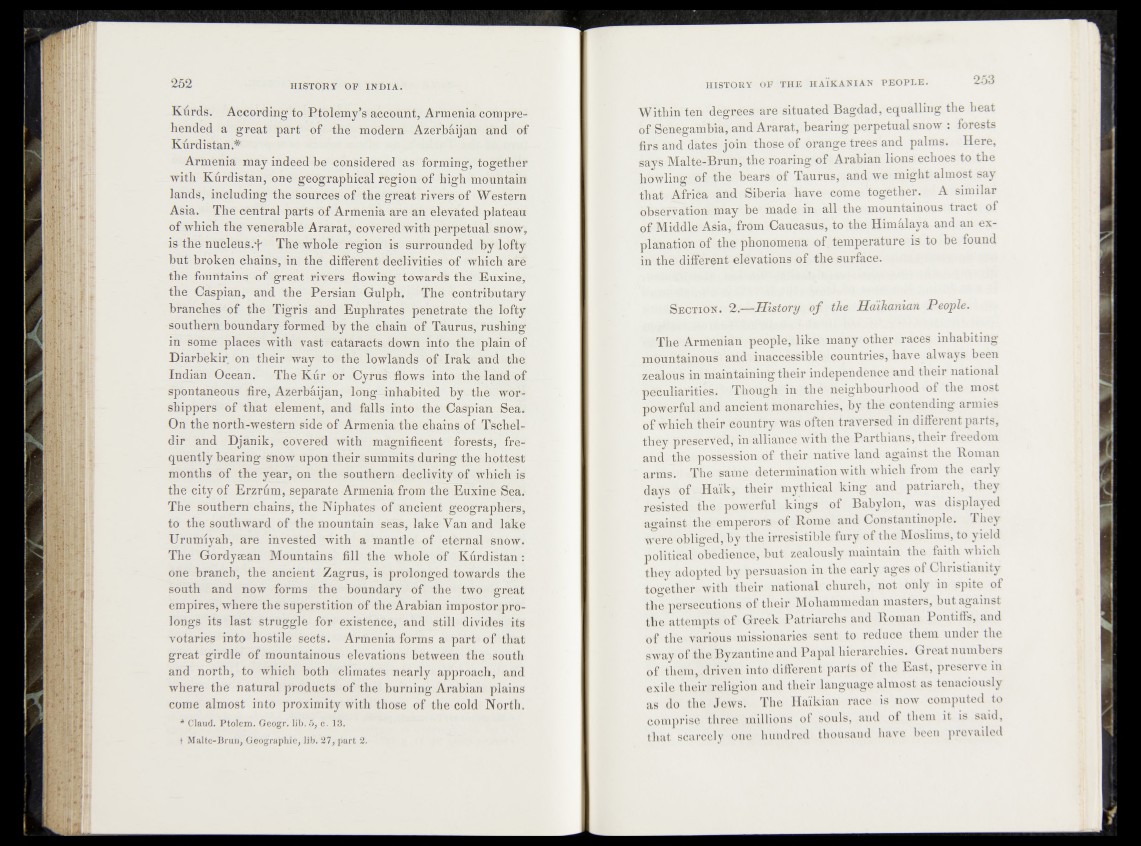
m
Kórds. According to Ptolemy’s account, Armenia comprehended
a great part of the modern Azerbaijan and of
Kurdistan.*
Armenia may indeed be considered as forming, together
with Kurdistan, one geographical region of high mountain
lands, including the sources of the great rivers of Western
Asia. The central parts of Armenia are an elevated plateau
of which the venerable Ararat, covered with perpetual snow*
is the nucleus.^ The whole region is surrounded by lofty
but broken chains, in the different declivities of which are
the fountains of great rivers flowing towards the Euxine,
the Caspian, and the Persian Gulph. The contributary
branches of the Tigris and Euphrates penetrate the lofty
southern boundary formed by the chain of Taurus, rushing
in some places with vast cataracts down into the plain of
Diarbekir. on their way to the lowlands of Irak and the
Indian Ocean. The Kür or Cyrus flows into the land of
spontaneous fire, Azerbaijan, long-inhabited by thé wori
shippers of that element, and falls into the Caspian Sea«
On the north-western side of Armenia the chains of Tschel-
dir and Djanik, covered with magnificent forests, frequently
bearing snow upon their summits during the hottest
months of the year, on the southern declivity of which is
the city of Erzrfim, separate Armenia from the Euxine Sea.
The southern chains, the Niphates of ancient geographers,
to the southward of the mountain seas, lake Van and lake
Urumlyah, are invested with a mantle of etèrnal snow.
The Gordyaean Mountains fill the whole of Kürdistan:
one branch, the ancient Zagrus, is prolonged towards the
south and now forms the boundary of the two great
empires, where the superstition of the Arabian impostor prolongs
its last struggle for existence, and still divides its
votaries into hostile sects. Armenia forms a part of that
great girdle of mountainous elevations between the south
and north, to which both climates nearly approach, and
where the natural products of the burning Arabian plains
come almost into proximity with those of the cold North.
* Claud. Ptolem. Geogr. lib. 5, c. 13.
t Malte-Brun, Geographic, lib. 27, part 2.
Within ten degrees are situated Bagdad, equalling the heat
of Senegainbia, and Ararat, bearing perpetual snow : forests
firs and dates join those of orange trees and palms. Here,
says Malte-Brun, the roaring of Arabian lions echoes to the
howling of the bears of Taurus, and we might almost say
that Africa and Siberia have eome together. A similar
observation may be made in all the mountainous tract of
of Middle Asia, from Caucasus, to the Himalaya and an explanation
of the phonomena of. temperature is to be found
in the different elevations of the surface.
Section. 2.—History of the Hdihmian People.
The Armenian people, like many other races inhabiting
mountainous and inaccessible countries, have always been
zealous in maintaining their independence and their national
peculiarities. Though in the neighbourhood of the most
powerful and ancient monarchies, by the contending armies
of which their country was often traversed in different parts,
they preserved, in alliance with the Parthians, their freedom
and the possession of their native land against the Roman
arms. The same determination with which from the early
days of Hai'k, their mythical king and patriarch, they
resisted the powerful kings of Babylon, was displayed
against the emperors of Rome and Constantinople. They
were obliged, by the irresistible fury of the Moslims, to yield
political obedience, but zealously maintain the faith which
they adopted by persuasion in the early ages of Christianity
together with their national church, not only in spite of
the persecutions of their Mohammedan masters, but against
the attempts of Greek Patriarchs and Roman Pontiffs, and
of the various missionaries sent to reduce them under the
sway of the Byzantine and Papal hierarchies. Great numbers
of them, .driven into different parts of the East, preserve in
exile their religion and their language almost as tenaciously
as do the Jews. The Haikian race is now computed to
comprise three millions of souls, and of them it is said,
that scarcely one hundred thousand have been prevailed